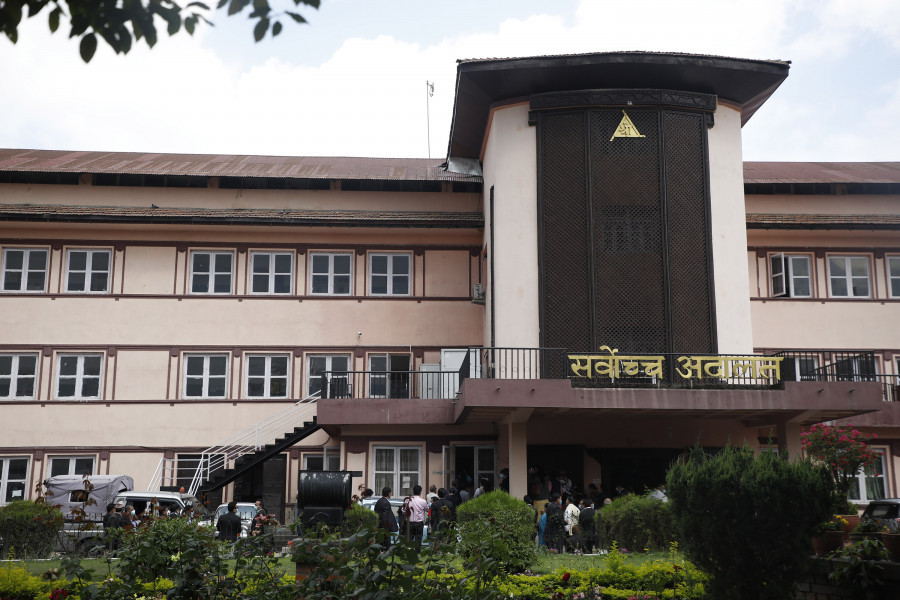National
Bench-hunting sets a bad precedent for the judiciary, according to experts
Crucial time of the Supreme Court is being wasted on unnecessary things, they say.
Binod Ghimire
A week after the dissolution of the House of Representatives, a Constitutional Bench was constituted on May 28 to start hearing on the writ petitions against the dissolution.
But two weeks since its constitution, the bench hasn’t formally started hearing the petitions. The discussions in the bench are hovering over its composition.
When the bench was constituted, the plaintiff’s lawyers questioned the impartiality of Justices Tej Bahadur KC and Bam Kumar Shrestha in the five-member bench, led by Chief Justice Cholendra Shumsher Rana. They argued that Shrestha was one of the justices on the bench that on March 7 passed a verdict which invalidated the Nepal Communist Party (NCP) and revived the CPN-UML and the Communist Party of Nepal (Maoist Centre), while KC was on the Rana-led bench that refused to review the decision of NCP invalidation.
The plaintiff’s lawyers argued that the current dissolution of the House was a result of the court’s move to invalidate the NCP. Justices Deepak Kumar Karki and Ananda Mohan Bhattarai were other members of the constitutional bench formed to conduct hearings on the 30 writ petitions challenging the May 22 House dissolution.
The bench was reconstituted on Sunday replacing KC and Shrestha with Justices Mira Khadka and Ishwar Khatiwada.
But now it was the turn of the defendant’s lawyers to question the composition. Attorney General Ramesh Badal and former Attorney General Agni Kharel, among others, defending Prime Minister KP Sharma Oli’s House dissolution move, said they were not convinced of the impartiality of Justices Karki and Bhattarai, who had said they wouldn’t be the part of the bench if KC and Shrestha didn’t recuse themselves.
Badal and Kharel on Sunday said the court should treat the plaintiffs and defendants equally and revisit the composition.
The proceeding scheduled for Monday was deferred as Chief Justice Rana was taken ill.
The hearing is expected to start on Wednesday; however, it would depend how defendant lawyers take their positions.
“It is unfortunate that the parties to the dispute are being allowed to choose the justices,” Bipin Adhikari, a former dean at Kathmandu University School of Law, told the Post. “This is a result of mediocrity in the court's leadership.
He says raising unnecessary suspicion on the Supreme Court and allowing the parties to the dispute to choose justices is yet another step towards polluting the judicial system.
Experts say by heeding the demands of the plaintiff’s lawyers, Rana had set a negative precedent whose consequences were seen immediately.
They say in the judicial system the discretion to whether to remain on the bench or rescue from it should be given to the respective justices. However, despite KC and Shrestha willing to remain on the bench, they were removed.
Balaram KC, a former justice at the Supreme Court, said many cases in the courts are connected, the justice process would be further delayed if justices are asked to leave the bench even in the cases that are not directly interlinked.
“The crucial time of the court is being wasted on unnecessary things,” KC told the Post. “This is a result of the lack of assertiveness in the chief justice.”
He said Chief Justice Rana should have exercised prudence while constituting the bench or at least shown resolve to defend his decision, but he failed on both counts.
Experts on the judicial and constitutional affairs say it is not that the plaintiffs and defendants cannot question the presence of any justices on a bench.
In the current case, both the sides are pressuring the judiciary, rather than just making requests, to recompose the bench.
Adhikari, the former dean at the Kathmandu University School of Law, said the way Badal presented himself in the court shows he was a personal lawyer to Oli as an individual not a prime minister.
He said Badal, the chief of a state’s constitutional body, seeking removal of a justice isn’t a common incident in a functioning democracy.
“Badal is a representative of the state. His job is to defend the government based on the constitutional provisions,” said Adhikari. “He has demeaned his position by demanding the justices of his choice.”
Some judicial experts say the current controversy over the integrity and impartiality of the justices is a worrying sign of declining public trust in the judiciary.
They say the situation arose because the Judicial Council failed to perform its job right from the selection to the scrutiny.
The council has the authority to pick justices for the Supreme Court and judges for the lower courts.
“When factors other than competency and integrity count in the appointment process, the impartiality of the court will always come into question,” Prakash Wasti, a former justice at the Supreme Court, told the Post. “The council also has failed to scrutinise the justices.”
The council headed by the chief justice, has law minister, a seniormost justice from the apex court, and one each recommended by the government and the Nepal Bar Association as members
Wasti said the failure of the council in performing its constitutional duties—selecting judges in a fair manner and rewarding and taking action as per their performance—is largely responsible for the present mess in the judiciary.
As the chief of the judiciary, it is the responsibility of Rana to introspect what is going wrong, say judicial experts.
“He should be evaluating his leadership and the performance of his fellow colleagues,” said Adhikari. “It is definitely not a good sign for the judiciary and the state as a whole that questions are being raised over the competency and integrity of the justices and the court.”




 17.9°C Kathmandu
17.9°C Kathmandu















